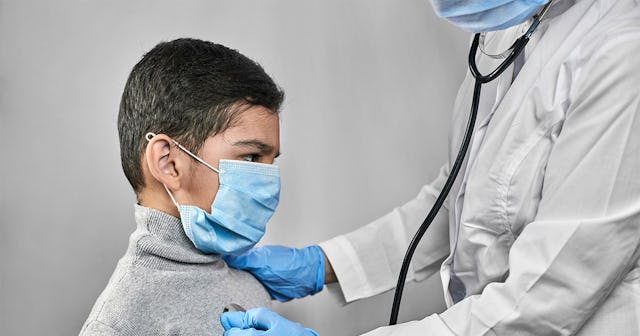School Nurses Are Essential And Overworked––Don't Forget About Them

We thought things were getting better. It was just last spring that the CDC announced that vaccinated individuals were no longer required to mask indoors as long as they kept up safe social distancing of six feet apart. Things were looking bright as vaccination rates were increasing and cases seemed to be slowing. And then the delta variant hit, which is extremely contagious and spreading among children. In July, the CDC reversed its recommendations and now wants even the vaccinated to remain masked indoors. Of course there are those who are fighting it and the virus continues to spread rapidly, particularly among children who are just getting back to school.
Our children need to be in school. They need to be around their friends and their teachers. But keeping them safe at school is a burden falling on our school nurses. Thousands of students across the country who began school within the last few weeks are already quarantined. Some of this is due to the fact that politicians are getting involved and making really stupid decisions. Case-in-point, FL Gov. Ron DeSantis.
This buffoon made masks in school optional by way of an executive order, stating that he was coming together with parents, students and elected officials. What about the teachers and the nurses, Ron? What about the safety of thousands of kids who are interacting on a daily basis? He went so far as to say that students subjected to,”’COVID-19 harassment’ which can include mask and COVID testing requirements, is eligible for a Hope Scholarship, which would allow the child to transfer to a private school or a public school in a different district,” reported NPR. What the actual fuck?
mmg1design/Getty
Thankfully a judge ruled that this was unconstitutional and school districts are able to require masks in the classroom. In Tampa, FL, school nurse Katherine Burdge is dealing with the repercussions of the back and forth from DeSantis’ order. According to NPR, her Hillsborough County district already has had to isolate or quarantine more than 13,000 teachers and staff. Among those quarantined more than 2,500 have tested positive.
“We’re dealing with COVID on the front lines every day,” she told NPR “It’s a serious manifestation that is just overwhelming the district, the state, everybody.”
How do we keep our nurses safe from the virus, while also allowing them to care for students with other needs? They are not simply COVID warriors; there are millions of students across the country that need things from school nurses like daily medications and bandages when they fall down.
School Nurse Liz Pray told CNN, “So, we’re dealing with all of their chronic health conditions like diabetes, asthma, allergies, and then on top of that, toss in all of the mental health pieces. The anxiety about walking in the door that first time. Depression because they’ve been at home without any socialization with their peers.”
Here are some staggering numbers. CNN has reported that the CDC recommendation for schools is one nurse per 750 students. Many of our schools educate thousands of students every day and are operating with one nurse, sometimes none. The Journal Of School Nursing publish date from a 2018 national school nurse workforce study that showed that 35% of schools have part-time nurses, 39% have full-time nurses, and 25% don’t have nurses at all. Those are some scary statistics.
wkevajefimija/Getty
Categorically nursing occupations face shortages and in schools it’s becoming dire. The amount of pressure that we are putting on our school nurses is frankly unfair. This gets particularly tricky when parents send their kids to school when they are symptomatic. And as we have learned in the last year and a half, nearly everything is a symptom and we must always err on the side of the utmost caution.
“The pandemic has highlighted that direct care is just one piece of the support that school nurses provide. They consult with school and district leaders, educate students and their families on how to stay safe and healthy, provide training for staff, perform case management for students with serious health concerns — just to name a few of their other responsibilities,” says Frontline Education.
They report that schools with full-time nurses see incredible benefits.
- Students tend to be absent less, leading to increased funding for schools
- Non-medical staff tend to send more students home, nurses on staff help students to spend more time in class
- Medical records are more accurate and complete
- Schools with nurses have higher vaccination rates
- Less students become pregnant
- Students with conditions such as asthma and diabetes have better health outcomes.
Eileen Gavin, a school nurse in Monmouth County, NJ told NPR that she echoes the concerns of so many. She wants children to be in school, but she also wants nurses to be treated fairly and respectively when students are present.
Gavin says her biggest fear is over school closures. “Kids need to be in school. We need to be in school,” she says. She hopes that putting layers of protection in place will allow the year to commence safely. “We need to kind of stand firm with that so that we can keep our schools open for our kids.
We must protect the nurses who care for our children at all cost. They need to be supported and we need to help them to understand that the outcome of the pandemic does not rest on their shoulders alone. We must communicate with our school district officials and parents and remind them that masking and vaccines are crucial to fighting this virus. We must remain steadfast in our beliefs that the science is the only way to win this battle.
This article was originally published on